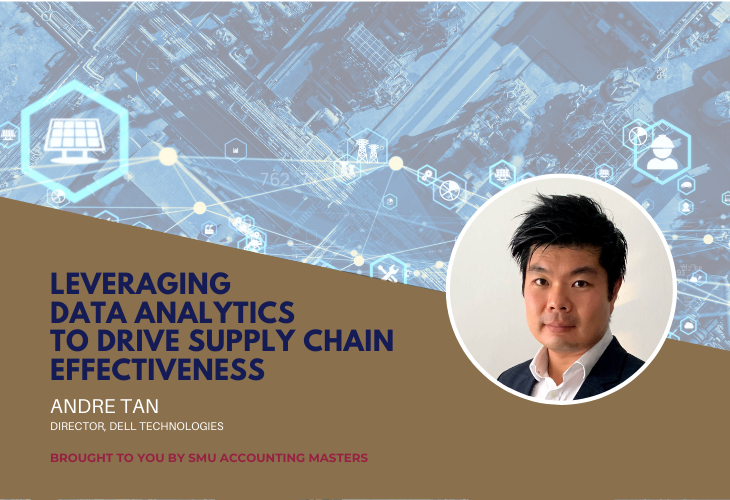In a world driven by data, advanced analytics is critical to helping businesses make faster, more informed decisions, especially in a world that can change at the drop of a pin. And when it comes to the supply chain, effective analytics can make or break a bottom line; whether it is establishing optimal procurement and sourcing processes, or forecasting demand from customers.
In the recent Accounting Masterclass titled Advanced Analytics within Supply Chain, Andre Tan, Dell Technologies’ Director of Data Science within Global Operations Data, Analytics and Automation organization, shared his insights on how data and predictive analytics steer more precise decision-making in the supply chain at Dell Technologies.
Although the link between accounting and the supply chain can seem like a stretch at first, many transactions flowing through a supply chain process eventuates in accounting entries – from impact to inventory and accounts payable, to assets under construction and revenue recognition. Tan continued that in order to ensure efficiency across the business, data analytics has been vital to Dell in identifying procurement needs and ensuring the timely delivery of products to customers, among other benefits.
With 25 factories worldwide, around 50 distribution warehouses and more than 900 parts warehouses, Dell ships over 220,000 orders per day, sells over 80 million units a year requiring billions of parts ranging from processor chips to storage drives. When you think of the cost of goods and operating expenses contributing to this, clearly, the stakes are high.
“There are many different partners in our ecosystem, which makes it very complex to operate. And what we realised, is there’s a lot of opportunity for embedding data analytics and predictive models to make our supply chain better, more robust, more efficient and more resilient,” said Tan.
This is where data science – a process by which data is analysed and used to provide a probabilistic approach to actionable insights, and then deliver business outcomes – comes in, stated Tan. Leveraging AI (artificial intelligence), Tan explained that understanding how supply chains operate and incorporating data science in a meaningful manner to generate business outcomes is something that makes Dell's supply chain more effective.
“According to Gartner, this year, AI will potentially generate $3 trillion in business value and increase productivity by six billion working hours. IDC also states that in a few years, over 50% of global GDP will be driven by organisations that have digitally transformed, and by 2025, 90% of new applications will have some embedded AI capabilities. So AI, as you already know, is an ever-increasing presence in everything that we do.” shared Tan. Another aspect in which data analytics would prove valuable is in the intersection between sales and supply chain planning. During the masterclass, Tan explained that sales representatives can take weeks, sometimes months, to negotiate large or complex deals with a customer.
“The problem is when the deal is closed, and customers want the goods as soon as possible, we can’t say ‘Oh, we need to go and build this once the sales contract has been signed." We need to have early visibility to be able to fulfil our orders quickly, and on time, in order to increase customer satisfaction,” he added. To do this, Dell has created a predictive model that can forecast whether and when an opportunity is going to be converted to a sale in order to gain more insight into the deal journey, and plan procurement, production and delivery times without breaking the bank, while sustaining customer satisfaction.
Another area where advanced analytics has played a part is in optimising inventory. “In terms of planning our inventory, we need to not only source lots of parts before they go to the factory, but also face the challenge of how many parts we should keep because if we keep too many, there’s a risk of excess, obsolescence, and storage costs. Or if we have too little then we will be short and can’t fulfil those orders. So, we need to know what is the optimum level of inventory to hold,” explained Tan.
To do this, they analyse the historical data to identify demand patterns at a part level, and choose which items to stock up on. Ultimately, what it comes down to, is being able to balance customer needs with optimal cost and supply chain efficiency. When looking at operating expenses, where there may be in excess of 10,000 suppliers being purchased from, visibility becomes critical. “Understanding what we’re spending our money on is integral to being able to deliver value for money, to choose the right suppliers on the right occasion and to be cost-efficient,” stated Tan.
While reducing costs and improving operations planning has always been among the top priorities in any business, the rise in digital transformation has also tipped the scales in favour of integrating data science and analytics in the supply chain to help these business decisions become faster and more sophisticated. According to Dell Technologies Digital Transformation Index, it was reported that eight out of 10 global businesses have accelerated at least some digital transformation programme in 2020. “During a pandemic, despite being conscious of costs, companies still recognised the need to invest in digital transformation,” Tan shared.
This shift in momentum, albeit driven by the pandemic that has changed the way businesses function today, means that businesses are now geared to take advantage of data analytics to not only enhance cost and operations efficiency but also prepare for potential opportunities or risks, with precision and foresight. “We have found Singapore to be the ideal global location for investing in our Enterprise digital and AI capabilities,” explained Tan. “Our Global Innovation Hub launched recently in Singapore has fuelled our capability to digitally transform our supply chain to be future proof and ready for the new data era.”
To find out more about SMU Accounting Masters, email Master of Professional Accounting at mpa@smu.edu.sg or email MSc in Accounting (Data & Analytics) at msa@smu.edu.sg.
[1] https://www.gartner.com/en/newsroom/press-releases/2019-08-05-gartner-says-ai-augmentation-will-create-2point9-trillion-of-business-value-in-2021
[2] https://www.idc.com/getdoc.jsp?containerId=prUS45613519
[3] https://www.delltechnologies.com/en-sg/perspectives/digital-transformation-index.htm





